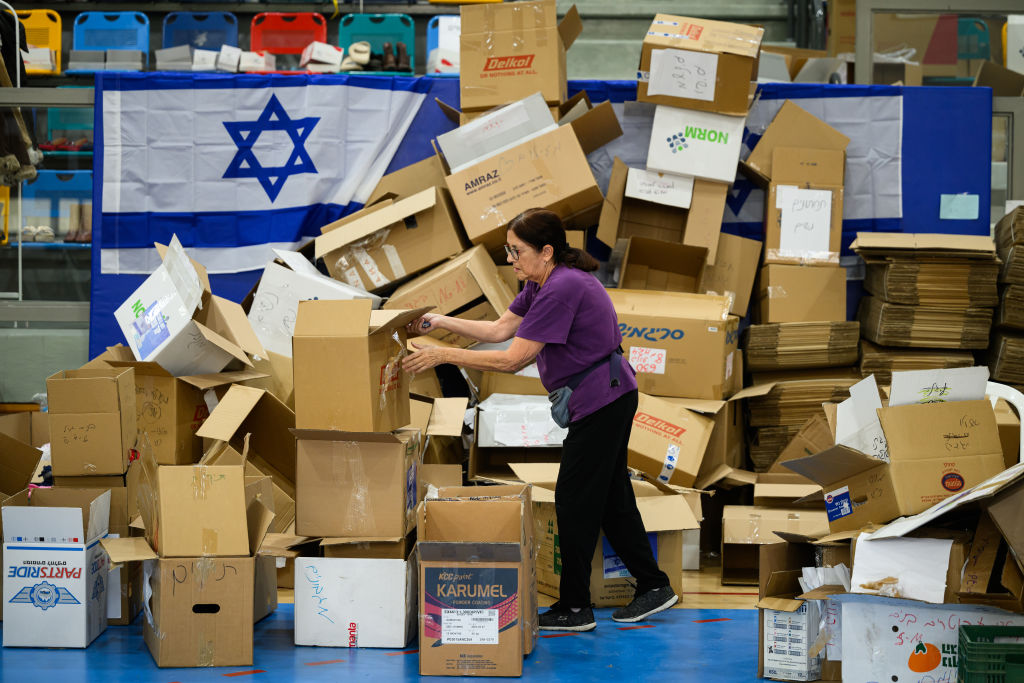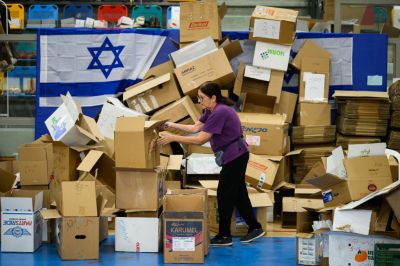TEL AVIV, Israel—“A WhatsApp group and a Google Sheet.” For 10 days after Hamas’ October 7 attack on southern Israel, that was how Yair Uziel said he and other civilian volunteers kept track of the thousands of people missing in the massacre’s wake. The makeshift list, which the group took upon itself to compile through days of nonstop communication with distraught families and traumatized survivors, would later become a key resource for an Israeli government caught flat-footed by the unprecedented attack.
“At the end of the day it wasn’t collecting information just to collect it. It was to share it with the state entities to give them a head start on understanding the situation in Israel,” Uziel told The Dispatch. “The country was in shock and all the systems were in shock and it took everyone a lot of time.”
This paralysis was evident as soon as the attack on October 7 began. For hours that morning, terrorists poured into Israel largely unchecked, devastating entire communities and dragging more than 200 hostages back to Gaza before the military finally arrived. Hordes of evacuated families found immediate support only through the generosity of their countrymen. Now, as the war rounds its second month, civilian groups continue to play a key role in bridging what many consider gaps in the government’s response.
Some of these organizations cropped up organically in the wake of October 7, while others are established advocacy groups repurposing their existing volunteer force to respond to the crisis. Their work ranges from obtaining tactical equipment to send to soldiers on the frontlines to rescuing stranded dogs and cats from ravaged kibbutzim. Many of the volunteers are operating from a common “war room”: Expo Tel Aviv, a convention center here in Israel’s second largest city.
Among them are organizations such as Brothers and Sisters in Arms and Bonot Alternativa, which, prior to October 7, organized large protests against the Netanyahu government’s controversial judicial reform plan. The massive demonstrations took place every week for more than nine months—until Hamas’ attack.
“On October 7, we woke up to a nightmare,” Lee Hoffmann Agiv, field operations manager for Bonot Alternativa (Hebrew for “Building an Alternative”), said in an interview. “By 9:30 a.m., we had a management meeting and we decided to stop all the protests immediately and that we needed to shift all of our communities into emergency communities,” she added, referring to the group’s roughly 80 chapters across the country.
Bonot Alternativa, a women’s organization, began in August 2020 to hold the perpetrators of a group rape in Eilat, Israel, accountable. It’s since swelled to nearly 100,000 members and taken up a range of feminist causes, from combating domestic violence to advocating on behalf of female athletes for equal pay. Since the war’s start, however, Bonot Alternativa has rebranded to help Israeli women and men from across the ideological spectrum.
One of the group’s first orders of business was matching displaced families from the south—and later people evacuated from the north amid fighting with Lebanese Hezbollah—with hosts across Israel. Its members have served as one of the main points of contact between October 7 survivors and local officials ever since, sometimes assuming governmental functions using its own funds and volunteers.
In one instance, volunteers in the coastal city of Netanya recruited staff and venues to run six kindergartens for evacuees after the city council approached the organization for help. In another, Bonot Alternativa shelled out thousands of shekels to prevent survivors from the southern city of Ofakim from being evicted after the local government failed to pay for their hotel bookings. The group has also sent equipment and supplies to female soldiers stationed near the border with Gaza amid shortages.
“A week after the war we realized that they had no mattresses to sleep on, no blankets to cover themselves, almost no clothes, because everything was destroyed in the attack,” said Hoffmann Agiv. “We were able to move very quickly and to act very quickly because we are not a government. But we did expect that after two weeks, maybe the government would wake up and take charge of everything. And that did not happen.”
Uziel’s informal team of volunteers had a similar experience as it advocated on behalf of kidnapped Israelis and their families. Their efforts began shortly after the massacre, when Uziel and a friend published their phone numbers in Ynet—a major Israeli news site—to solicit information about missing persons amid reports that law enforcement agencies and other government entities weren’t answering calls. Operators on the police hotline eventually began directing callers to the civilian volunteers as well, said Uziel, who manages customer support teams for startups in his day job.
The group also obtained a list of the some 3,000 people who purchased tickets to attend the Nova music festival in the Negev Desert, where it was later determined Hamas terrorists had killed 364 people and abducted 40 others. The civilian volunteers combed through the names, provided to them by an organizer of the event, and attempted to contact each person to keep a record of survivors—information that they later provided to the army at its request.
For many Israelis, the two months since the attack have highlighted the gap between what they expect from their government and what it’s actually able to provide. The most basic of which is security: Since October 7, more than 600 civilian-run squads have cropped up to defend their communities. More than 260,000 Israeli civilians have submitted requests for firearm permits in the same period.
But some volunteers say even simpler governmental tasks, like maintaining a line of communication with those most affected by massacre, have also been outsourced to civil society.
“Bureaucracy kind of showed its face fully, unfortunately,” said Uziel, who is now volunteering with the Hostage and Missing Families Forum, pointing to government officials’ delayed outreach to the families of missing persons. “They just failed to create the very basic connection and to say, ‘Hi, we know someone from your family is missing, we’re on it, we’ll keep you posted.’ Even that basic kind of understanding, because being in a state of having no idea what’s going on is the worst.”
“You should see how happy families are when the state of their loved ones is moved from ‘unknown’ to ‘kidnapped,’” he added. “They are just looking for this recognition that someone is aware of their situation.”
On the frontlines in Gaza and near the Lebanese border to the north, groups have mobilized to ensure Israel’s fighting force has the equipment and supplies it needs. The Israeli Defense Forces (IDF) in October called up more than 360,000 reservists in the wake of the Hamas attack. Tens of thousands who weren’t summoned also showed up, presenting a formidable fighting force but exacerbating supply shortages.
Drawing on local and international donations, volunteer groups have sought to make up the difference by buying up and delivering protective gear like kevlar, helmets, and knee protectors to IDF troops. They’ve also sourced more mundane supplies, from underwear to rain ponchos to ointment.
One of the groups working to supply Israeli troops is the Mobilization Headquarters for the Film and Television Industry, composed entirely of workers in show business. Ori Sedlinsky, an executive producer and member of the organization, said this civilian background proved to be a strength as the industry acted quickly to respond to the multifaceted crisis. What started as a small WhatsApp group chat grew into a volunteer force of more than 1,000 people over the course of 72 hours.
“I always say we are circus managers. It’s a film set and film productions, but this is what we do. We know how to work very, very fast,” Sedlinsky told The Dispatch. “People working for the government are not used to working in this space.”
“The army works in a specific way. They have contracts, and they have to do everything by the law. If you’re a civilian, you just transfer the money and the equipment goes on a plane and comes to Israel,” he added. “We learned in this war that civil organizations are so important.”







Please note that we at The Dispatch hold ourselves, our work, and our commenters to a higher standard than other places on the internet. We welcome comments that foster genuine debate or discussion—including comments critical of us or our work—but responses that include ad hominem attacks on fellow Dispatch members or are intended to stoke fear and anger may be moderated.
With your membership, you only have the ability to comment on The Morning Dispatch articles. Consider upgrading to join the conversation everywhere.